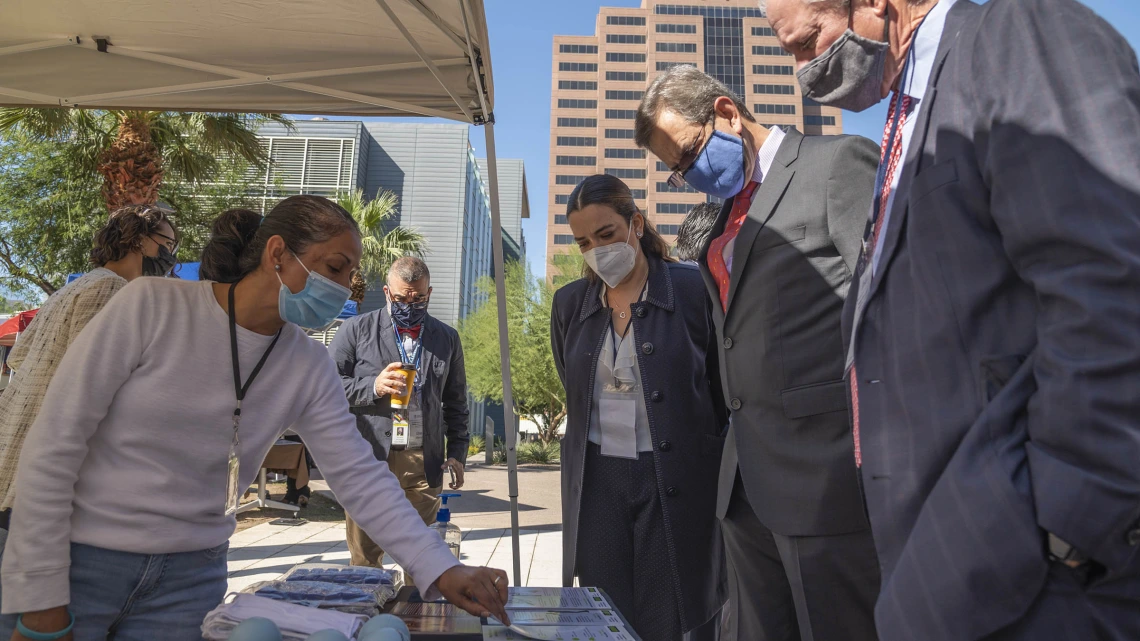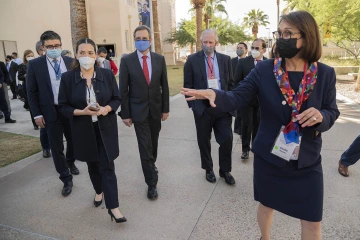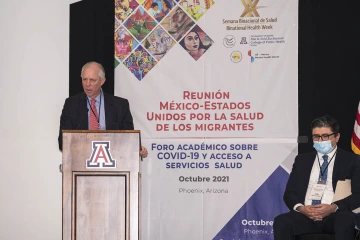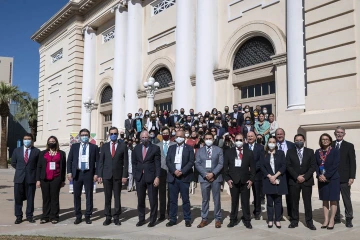Phoenix Biomedical Campus Hosts U.S.-Mexico Health Summit
As border reopening nears, a $2.5 million grant and new HQ for the Ventanilla de Salud program are announced to support expected increase in visitors.

UArizona President Robert C. Robbins, MD, (right) and Mexican Ambassador to the U.S. Esteban Moctezuma Barragán (second from right) examine displays at the U.S. Mexico Binational Health Leadership Summit health fair on the Phoenix Biomedical Campus.
The recent announcement that the U.S. will reopen its borders to vaccinated travelers on Nov. 8 provided near-perfect timing for an updated agreement on a U.S.-Mexico preventive health program and new private funding that will expand it. The Ventanilla de Salud program, which started in 2003, was a major focus of the U.S.-Mexico Binational Health Leadership Summit hosted on Oct. 13-14 in Phoenix by the Mel and Enid Zuckerman College of Public Health.

Cecilia Rosales, MD, MS, the Mel and Enid Zuckerman College of Public Health’s associate dean for Phoenix programs, provides President Robbins and Mexican Ambassador Esteban Moctezuma Barragán, a tour of the Phoenix Biomedical Campus.
Mexican Ambassador to the U.S. Esteban Moctezuma Barragán also announced the program’s national headquarters will move from New York City to Phoenix. With that move, the College of Public Health will serve as technical advisor for the administration of Ventanilla de Salud in coordination with the U.S.-Mexico Border Health Commission’s Mexico Section, Mexico’s Institute for Mexicans Abroad and its Ministry of Health.
When Ventanilla de Salud started nearly 20 years ago, Cecilia Rosales, MD, the College of Public Health’s associate dean for Phoenix programs, was a liaison to the U.S.-Mexico health commission as chief of the Office of Border Health for the Arizona Department of Health Services. In 2006, President George W. Bush appointed her to the commission. She served until 2016, continuing afterward as a national advisory board member for the Ventanilla de Salud program.
Today, Ventanilla de Salud can be found at 51 Mexican consulates across the U.S. In Arizona, that includes consulates in Phoenix, Tucson, Douglas, Nogales and Yuma. The program’s aim is to increase access to health care and health literacy, to provide health screenings and referrals, and to promote healthy lifestyle choices among low-income migrant and immigrant Latin American populations in partnership with community organizations, federal and state agencies and volunteers in the U.S.

President Robbins addresses the attendees.
The Mobile Health Units Program, which Dr. Rosales heads at the College of Public Health, grew out of initial funding from the U.S.-Mexico commission. Other mobile units now operate in 11 U.S. cities, offering similar services. In Arizona, the mobile units were deployed during the pandemic to extend health outreach by email, telephone, online meetings and social media to people across the state.
The Mobile Health Units also have been the tip of the spear for distribution of COVID-19 vaccines to those same populations through the Mobile Outreach Vaccination and Education for Underserved Populations (MOVE UP) Program in Maricopa and counties along the Mexico border.
Ambassador Moctezuma lauded Dr. Rosales, saying, “She has been an exemplary collaborator, providing vaccines not only at consulates but across the border at ports-of-entry between our two countries.”
The summit, held as part of Binational Health Week, was sponsored by the College of Public Health in conjunction with Mexico’s Ministry of Health, Ministry of Foreign Affairs and Institute of Mexicans Abroad, along with the U.S.-Mexico Border Health Commission and community partners from the U.S. and Mexico. It was the first time the summit was held in Phoenix.

The group of Mexican government officials, University of Arizona representatives along with state and local leaders pose after announcing a memorandum of understanding.
University of Arizona President Robert C. Robbins, MD, said he was glad UArizona was hosting the summit as well as its Academic Forum on COVID-19 and Access to Health Services.
“Despite efforts that prioritize accessibility, we know the pandemic has exposed and exacerbated disparities in access to health care that unfortunately still exist in the United States. I am pleased to see programs like Binational Health Week and Ventanilla de Salud at work today in these important meetings. These strategies cross sectors to positively impact the lives of some of the most vulnerable members of our society, and provide them with knowledge and resources here to live healthier lives.”
He added that UArizona’s priority in that regard was to “build bridges, not walls” to serve everyone.
Dr. Rosales credited Dr. Robbins with promoting improved relations and collaboration with Mexico through his establishing an Office of Global Initiatives and an assistant vice president for Mexico Initiatives, Justin Dutram.
About 150 people attended the summit, including the ministers of health for the six border states on Mexico’s northern border who each presented on COVID-19 response and vaccination efforts in their respective regions. UArizona presenters included Tyler Ripperger, an immunobiology doctoral student who discussed UArizona’s top-rated COVID-19 antibody test and long term vaccine immunity research; Karl Krupp, PhD, who spoke about vaccine access and hesitancy research; and Esther Sternberg, MD, and Atlaf Engineer, PhD, who discussed the impact of stress and the built environment on productivity and mental health moving forward from the pandemic.

